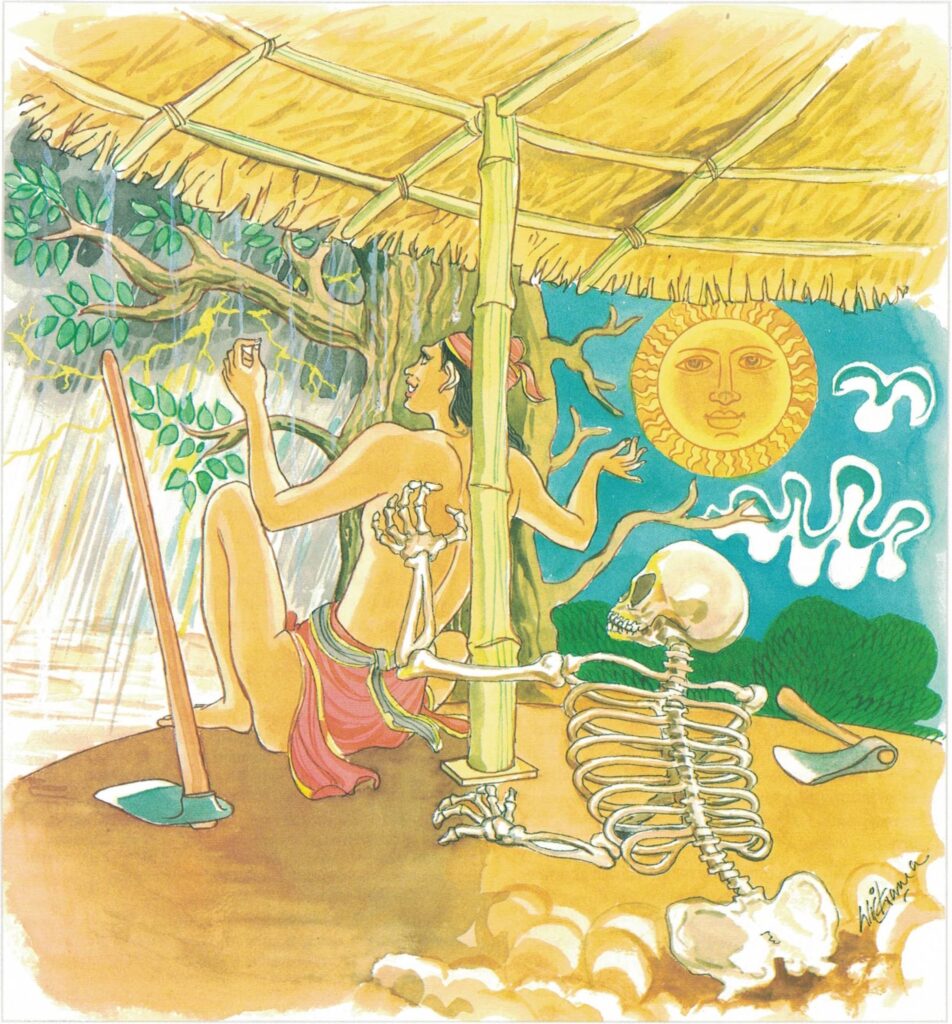Pali text, illustration and English translation of Dhammapada verse 286:
idha vassaṃ vasissāmi idha hemanta gimbhisu |
iti bālo vicinteti antarāyaṃ na bujjhati || 286 ||
286. Here shall I spend the Rains, here the Winter, here the Summer. Thus speculates the fool, the danger he knows not.

The Story of Mahādhana, a Merchant
While residing at the Jetavana Monastery, the Buddha spoke this verse with reference to Mahādhana, a merchant from Vārāṇasi.
Once, a merchant from Vārāṇasi came to a festival in Sāvatthi with many carts fully loaded with textiles and other merchandise. When he reached a river bank near Sāvatthi the river was in spate; so he could not cross the river. He was held up for seven days as it was raining hard and the water did not subside. By that time, he was already late for the festival, and there was no need for him to cross the river.
Since he had come from a long distance he did not want to return home with his full load of merchandise; So he decided to spend the rainy season, the cold season and the hot season in that place and said so to his assistants. The Buddha while going on an alms-round knew the decision of the merchant and he smiled.
Ānanda asked the Buddha why he smiled and the Buddha replied, “Ānanda, do you see that merchant? He is thinking that he would stay here and sell his goods the whole year. He is not aware that he would die here in seven days’ time. What should be done should be done today. Who would know that one would die tomorrow?
We have no date fixed with the king of death. For one who is mindful by day or by night, who is not disturbed by moral defilements and is energetic, to live for just one night is a well-spent life.
Then the Buddha sent Ānanda to Mahādhana, the merchant. Ānanda explained to Mahādhana that time was running out for him, and that he should practice mindfulness instead of being negligent. On learning about his impending death, Mahādhana was alarmed and frightened. So, for seven days, he invited the Buddha and other monks for alms-food. On the seventh day, the Buddha expounded a discourse in appreciation (anumodanā). At the end of the discourse, Mahādhana the merchant attained sotāpatti fruition. He followed the Buddha for some distance and returned. On his return, he had a severe headache and passed away soon after. Mahādhana was reborn in the Tusita deva world.
Explanatory Translation (Verse 286)
vassaṃ idha vasissāmi hemantagimhisu idha
iti bālo vicinteti antarāyaṃ na bujjhati
vassaṃ [vassa]: during (the four months of) rain; idha: in this place; vasissāmi: I will reside; hemantagimhisu: in winter and summer; idha: here (I reside); iti: this way; bālo: the ignorant person; vicinteti: thinks; antarāyaṃ the danger to his own self; na bujjhati: (he) is not aware of
In the four months during retreat, winter or summer, in a chosen place, the ignorant plans, unaware of the threat of death.
Commentary and exegetical material (Verse 286)
antarāyaṃ na bujjhati. does not see the danger to his own life. The merchant in this story was not mindful of the fact of death. There are in this world people in various walks of life who resent the very word death, let alone reflect on it. Infatuated by long life, good health, youth and prosperity, they completely forget the fact that they are subject to death. Immersed in the evanescent pleasures of the five-fold senses, they seek only after material progress in this world, completely disregarding a future life, and indulging in vice through the mind, body and speech, They regard this impermanent and evanescent life as permanent and everlasting. It is to arouse a sense of dissatisfaction in such blind and ignorant people, to allay the pangs of sorrow caused by the separation of animate objects, like parents and children, and inanimate objects, like wealth and property, to inculcate the doctrine of impermanence in all beings, and thereby convince them of the unsatisfactoriness of life, and direct them towards the attainment of everlasting peace, that the Buddha preached these words.
A person who has not comprehended the doctrine of the Buddha is infatuated by long life and considers himself as immortal, even though he may see many deaths around him; he is infatuated by good health and considers himself free from disease even though he may see countless diseased persons around him; he is infatuated by youth even though he may see many aged persons and considers himself as one who is not subject to old age; he is infatuated by wealth and prosperity even though he may see countless persons rendered destitute through loss of wealth; and he never thinks for a moment, that he too, might be subjected to such a state.